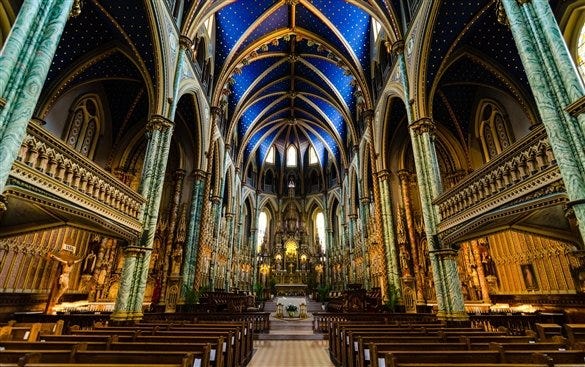The Necessity of Beauty

We live in a terribly efficient world. Time and space must be practical, functional. All the frills that remove from the bottom line, that aren’t absolutely necessary to what we are producing, must be discarded. Consequently, many people sit in maximally utilized, monochrome office space just functioning. We are like machines putting out products. The last thing a functional machine needs is beauty. Beauty is not productive. Beauty is not efficient. It is wasteful; a luxury at best. Our money can be spent better elsewhere.We live in a terribly efficient world. Time and space must be practical, functional. All the frills that remove from the bottom line, that aren’t absolutely necessary to what we are producing, must be discarded. Consequently, many people sit in maximally utilized, monochrome office space just functioning. We are like machines putting out products. The last thing a functional machine needs is beauty. Beauty is not productive. Beauty is not efficient. It is wasteful; a luxury at best. Our money can be spent better elsewhere.
The church has not escaped this cultural trap. Many of us Protestants meet in warehouses and strip malls, sometimes out of necessity to be sure, but sometimes because it is efficient. The money we make is better used to feed the poor or send to foreign missionaries. Both inside and out our architecture and art scream that beauty is not important to us.
In the midst of a hungry and lost world, God is wasteful; or so it would seem from our generally accepted standards of wastefulness. In the middle of the wilderness, with a people who didn’t even have a permanent place to call “home,” God tells Moses to make his brother, Aaron, garments for glory and beauty (Exod 28.2). These garments were made of the most expensive fabrics, rare and carefully crafted stones, and woven throughout with gold threads. What a waste. Couldn’t these things have been sold and given to the poor? While the world is dying and going to hell, God has his people making a glorious tent and beautiful clothes for a high priest.
God doesn’t do anything that isn’t necessary. The beauty he prescribes is necessary for his people and the world. There is no waste in beauty.
We were created to make things beautiful. In the beginning God told man to take dominion over the earth, making it fruitful in every way. God gave man the pattern in creating a beautiful garden. Man, in turn, was to make the world a place of glory and beauty. We and the world were to move from glory to glory; from beauty to beauty. Beauty is the fruit of a people who are maturing in righteousness. The movement of the Scriptural story attests to this truth. In the beginning man is naked and in a relatively undeveloped world. The last images of Scripture are of a beautifully clothed people in a fully developed city, a city that is the product of the dominion of Christ and his people.
Jesus himself reveals this progress in his own life. We hear in Isaiah that he begins with “no beauty that we should desire him.” But in the Revelation, he is a glorious figure. We and the world are transformed in the likeness of Christ’s transformation. We are moving from beauty to beauty.
Transformation of the world into the beautiful is the calling of the Christian church as she matures. Developing beauty is non-optional for the faithful.
Beauty reflects our progress in time, but beauty also reflects our future, revealing our hope, what we will be. Beauty draws us into this future and gives us hope. If you have ever been overwhelmed by beauty, you know what I mean. Beauty overwhelms us; not in a condemning way or in a way that leaves us at a distance. Beauty draws us in and calls us up to be better than we are. We are inspired by beauty. In the midst of an ugly world, beauty is one aid among many to refresh the soul.
Making things beautiful is an exercise in faith. Creating beauty declares that there is more to this life than an efficient, machine-like existence. Creating beauty says that we serve a beautiful God, and we are becoming more and more like him.
Though beautiful art and architecture can never do it by itself, beauty is integral in calling the Christian community to faith. God creates garments of glory and beauty for Aaron so that he and the people he represents will “live up to them.” Beauty says, “This is who you were made to be. Now, live beautifully.” Show the world this beauty, and they will be drawn to it.
Charles Klamut summarizes all of this very well when he writes:
‘Beauty will save the world.’ That remains to be seen. But beauty has saved me, and continues to do so. My experience is that I need saving; it is not a luxury. Beauty saves. Or, to put it more precisely, beauty points me to the One who saves, who is Beauty itself. Beauty is a necessity, not a luxury. Beauty moves us, awakens us, provokes us, bringing freshness and newness to hearts that have too easily grown old and stale. A luxury is something extra, added on after duties are complete. But beauty is not something extra, it is what comes first. Because without beauty, the duties prove too hard and, eventually, seem pointless. An old, tired soul cannot move itself, cannot sustain itself. It ultimately fails in its tasks. Beauty renews the soul, pointing us ever back to our origins and our destiny, making life begin again. May God never leave us bereft of anointed artists, prophets, and poets of the transcendent, who will keep wounding our hearts with nostalgia for the infinite destiny which alone matches the proportions of our great hearts.(Fr. Charles Klamut; http://www.hprweb.com/2013/01/beauty-a-necessity-not-a-luxury/ )
The post The Necessity of Beauty appeared first on Kuyperian Commentary.

